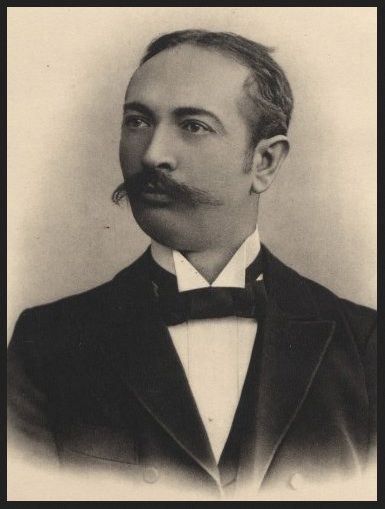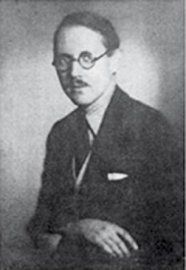Aleksander Brückner

Today there are only a few graves at the Tempelhof Park Cemetery. In a few years it will lose the name of cemetery and simply be known as the Tempelhof Park. Amongst the still remaining gravestones is one whose inscription is written in both German and Polish. It belongs to the grave of the famous Polish professor at the Berlin University, the leading Slav expert of his age and one of the last true humanists - Aleksander Brückner.
Aleksander Brückner was born in 1856 in Brzeżany near Tarnopol in Habsburg Galicia. His German family had lived there for generations and had become grounded in Polish culture. Aleksander was a clever young man who loved learning and learnt a lot. He completed his studies at the grammar school in Lemberg (Lwiw) with distinction. In Lemberg (Lwiw) he read Slavic studies and continued his education in Leipzig and Berlin. In 1876 Brückner completed his doctoral studies in Vienna with a thesis entitled “Slavic Foreign words in Lithuanian”. In 1878 he qualified as a university lecturer in Leipzig with a study entitled “The Slavic Settlements in the Altmark and Magdeburg Region”.
Aleksander Brückner must have made a great impression on the professor at the Berliner University Vatroslav Jagić, one of the most important experts in Slavic studies in the second half of the 19th century. For after a short period of activity as a guest lecturer in Lemberg (Lwiw) when he was just 25 Aleksander Brückner was brought by Vatroslav Jagić to be his successor in Berlin in 1881. Vatroslav Jagić’s decision was correct and Aleksander Brückner more than fulfils the faith placed in him. With Aleksander Brückner the Berlin University had gained one of the best scholars in his field of knowledge. Aleksander Brückner zealously researched and taught at the University in Berlin for a total of 44 years. Alongside Slavic philology he was a distinguished expert in the fields of literature, cultural history, folklore, Slavic mythology and pre-Christian religions. After his retirement from professional life he remained in Berlin to pursue his studies further. All in all he wrote over 1800 publications, the most important of which were “The Etymological Dictionary of the Polish Language” (1927), “Slavic Foreign Words in Lithuanian“(1877), “Marginal Notes on the Kashubian Question” (1899), “A History of Russian Literature”(1905), “Russian Literature History” (1919), “Polish Literature History (1920), “A History of Polish Literature” (1922) and “Slavic Mythology” (1924).
In his tireless search for new knowledge he undertook many troubles to a host of educational centres in Europe. In the Russian National library in St Petersburg he found the so-called “Heiligkreuzer Sermons” in the front cover of a mediaeval codex. They date back to the 13th or 14th century and are the oldest known prose writing in the Polish language. Thanks to Aleksander Brückner they have been saved for posterity.
Aleksander Brückner, who was regarded as a lone wolf, was highly regarded by his colleagues. He was a member of the Polish Academy of Learning in Kraków, the Russian Academy of sciences in St Petersburg and the Society of sciences in Lemberg (Lwiw). He was the recipient of many prizes and in 1935 was made an honorary doctor of Warsaw University.
Aleksander Brückner defined himself as a pole and underlined this often in many situations. Nonetheless he was a decided opponent of idealising Polish history into a purely glorious and heroic tale. On the other hand Brückner was also a loyal German civil servant. Hence he praised the German Polish symbiosis in the Polish areas that were annexed during the division of Poland by Prussia.
On 24 May 1939 Aleksander Brückner died at the age of 83 in Berlin. At the request of his wife Emma Brückner he was buried in Berlin at the Tempelhof Park cemetery. Since the honorary patronage of the Berlin Senate over the grave of Aleksander Brückner ran out in 2012 private initiatives along with Polish and German diplomats are now trying to find a permanent solution for the grave and memorial place of the greatest Polish Slavic scholar in Berlin.
Aleksander Brückner’s grave can now (03/2014) be found at the Tempelhof Park cemetery in Gottlieb-Dunkel-Straße 26 - 27, Part 34, Quartal 44/45. The Tempelhof Park cemetery will close for ever in 2027.
Adam Gusowski, March 2014
Ed. note:
In 2023, the mortal remains of Aleksander Brückner were exhumed and reburied in the Rakowicki cemetery in Krakow.





